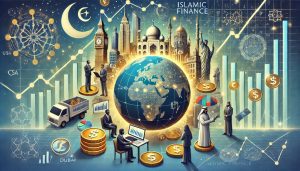Sharia as a Global Economic Phenomenon

By Dr. Abdul Wadud Nafis, LC, MEi
The concept of sharia, once solely recognized in religious contexts, has now evolved into a significant global economic phenomenon. Minister of Religious Affairs Nasaruddin Umar emphasized that sharia is not only about religious law but also plays an essential role in shaping the world economy. Halal products, halal lifestyles, and sharia finance have now become integral parts of the global market. By promoting the development of relevant sharia literature in line with modern economic dynamics, we can ensure that the principles of sharia continue to contribute to the creation of a just, sustainable, and inclusive economy for all of humanity.
Here is a more comprehensive and structured explanation in bullet points regarding the concept of sharia as a global economic phenomenon:
1. Transformation of Sharia in the Global Economy
From Religion to Economy: Sharia is now viewed not only as religious law but also as a global economic phenomenon. This encompasses all aspects of life, including the economy, which is based on Islamic moral and ethical principles.
Growth of the Halal Market: Halal products and lifestyles have become key components in the global economy. This market is not only expanding in Muslim-majority countries but also in non-Muslim countries, demonstrating the vast potential of sharia in the global economic landscape.
2. Paradigm Shift in the Halal Industry
Halal Products: Food, pharmaceuticals, cosmetics, clothing, and other products now have halal certifications ensuring they comply with sharia principles. This includes cleanliness, the materials used, and production methods.
Sharia Finance: Sharia-compliant financial institutions offering interest-free banking, investment based on justice and balance, and financing that avoids speculation are becoming increasingly accepted globally. Islamic banking and sukuk (Islamic bonds) are vital instruments in the international financial system.
Halal Tourism: The halal tourism industry is also growing rapidly, with tourist destinations providing facilities that cater to Muslim needs, such as prayer spaces, halal food, and services that align with sharia principles.
Halal Fashion and Cosmetics: The halal fashion and cosmetics industries are expanding, with designs and materials that meet sharia requirements, offering Muslim consumers worldwide alternatives that align with their values.
3. The Importance of Sharia Literacy in the Modern Economy
Development of New Literature: Minister Nasaruddin Umar highlighted the need for new sharia literature to remain relevant to modern economic developments. This literature would connect sharia principles with contemporary economic challenges such as globalization, digitalization, and sustainability.
Research and Innovation: The development of sharia studies in economics could include themes such as sustainable development, social justice, and inclusivity within the global market.
Global Impact: This new literature is also important to ensure that sharia not only meets the needs of local markets but can compete and provide solutions for global economic issues like economic inequality, climate change, and social crises.
4. The Implications of Sharia Economics in the Global Economy
Sustainability and Business Ethics: Sharia economics emphasizes principles of sustainability, justice, and transparency. Therefore, it can significantly contribute to achieving sustainable development goals (SDGs) and ensure that economic activities benefit not just a few but the entire society.
Inclusivity: With an increasing number of companies and countries adopting sharia principles in their businesses, sharia economics can create a more inclusive environment where every individual can benefit from a fairer and more transparent economic system
5. Opportunities for Entrepreneurs and Nations
Halal Market Potential: Countries with the largest Muslim populations, such as Indonesia, Malaysia, and Turkey, are at the center of sharia economic development. However, there is also significant market potential in non-Muslim countries like Japan, South Korea, and European nations, which are increasingly adopting halal products and services to attract consumers.
Global Collaboration: Countries can form collaborations to develop the halal industry and share knowledge in the development of sharia economics. For instance, international organizations could work together to create global standards for halal products and services.
Conclusion
Thus, sharia is no longer just a religious law but has evolved into an economic phenomenon that aligns with the needs of the global community. As part of the global economy, sharia plays a strategic role in creating a more just, sustainable, and inclusive economy, providing solutions to modern economic challenges. With the rapid growth of sharia economics on the global stage, it is now time for us to recognize that sharia is not just a spiritual guide but also a foundation for a more equitable and sustainable economy. Through continuous understanding and innovation, sharia will become even more relevant in addressing modern economic challenges and shaping a more prosperous and inclusive world.
References
1. Umar, Nasaruddin. “Sharia as a Global Economic Phenomenon.” Journal of Sharia Economics, vol. 12, no. 3, 2024, pp. 45-60.
2. Al-Qaradawi, Yusuf. Fiqh Ekonomi Islam. Cairo: Dar Al-Tawhid, 2005.
3. Rida, Rashid. Al-Islam wa Al-Iqtisad: Al-Muqaddimah li-Fahm Al-Iqtisad Al-Islami. Beirut: Dar Al-Fikr, 1996.
4. Muhammad, Abduh. Risalah fi Al-Iqtisad Al-Islami. Cairo: Dar Al-Ilm, 2003.
5. Iqbal, Zubair. “The Role of Islamic Finance in Modern Global Economy.” International Journal of Islamic Economics, vol. 19, no. 1, 2022, pp. 32-50.
6. Khan, Faiyaz. Islamic Banking: A Contemporary Perspective. New York: Routledge, 2021.

